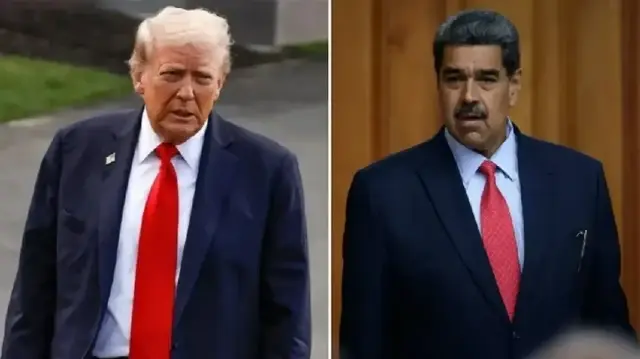As the Trump administration ramps up its pressure campaign against Venezuelan President Nicolás Maduro, a Republican congresswoman has issued a bold warning: The United States is on the brink of direct military action to topple his regime. In a tense Fox Business interview, Rep. Maria Salazar (R-Fla.), chair of the House Foreign Affairs Subcommittee on the Western Hemisphere, declared that Maduro “understands that we are about to go in,” drawing parallels to the 1989 U.S. invasion of Panama. Her comments, made amid a flurry of military maneuvers and diplomatic saber-rattling, have ignited fears of another Latin American conflict and sparked comparisons to historical U.S. interventions.
Salazar, a vocal critic of Maduro’s authoritarian rule, argued that intervention is not just necessary but beneficial. “We’re going to be doing a favor to us, to our children, to our economy, to our oil companies, to be able to liberate, and to the Venezuelans,” she said. She portrayed Maduro as the “head of a terrorist organization,” placing him squarely in the U.S. government’s crosshairs under domestic laws that could justify his removal—either through extradition or a full-scale operation. The invasion of Panama, which lasted just over five weeks and ousted dictator Manuel Noriega, serves as her blueprint: a swift strike that, despite costing around 500 Panamanian lives and 23 American soldiers, ended a brutal regime.
This rhetoric comes on the heels of aggressive moves by the Trump administration. On November 16, the State Department formally designated Maduro and his allies as members of a foreign terrorist organization, specifically targeting the so-called “Cartel de los Soles”—a loose network of Venezuelan military and government figures accused of drug trafficking. While the label imposes crippling sanctions on Maduro’s assets and infrastructure, it stops short of explicitly greenlighting lethal force. Legal experts note, however, that it expands the U.S. military’s options for targeted strikes inside Venezuela.
The Pentagon’s “Operation Southern Spear” underscores the escalation. Since early September, U.S. forces have conducted at least 21 strikes on suspected drug boats in the Caribbean and Eastern Pacific, killing over 80 people—though the military has yet to provide concrete evidence linking the vessels to narcotics. More than 15,000 troops are now deployed in the region, bolstered by a formidable naval presence: the USS Gerald R. Ford aircraft carrier, guided-missile destroyers, cruisers, amphibious assault ships, and dozens of fighter jets stationed in Puerto Rico. On Thursday, the U.S. staged its largest aerial display near Venezuela’s coast, featuring F/A-18E Super Hornets, B-52 bombers, and reconnaissance planes— a clear show of force captured in open-source flight data.
Psychological warfare is also in play. U.S. officials have floated the idea of air-dropping leaflets over Caracas, Venezuela’s capital, as early as Sunday—coinciding with Maduro’s 63rd birthday—to erode his support and sow discord. Though not yet approved, the proposal highlights the administration’s multi-pronged strategy. President Trump, briefed on options ranging from facility strikes to special operations raids, has refused to rule out boots on the ground. “I don’t rule out anything,” he said Monday. “We just have to take care of Venezuela.”
The crisis traces back to July 2024, when Maduro claimed victory in a presidential election widely condemned as fraudulent—results showed him losing by a wide margin to opposition leader Edmundo González. The U.S., along with much of the international community, refuses to recognize Maduro’s legitimacy. In response, Trump has offered a $50 million bounty for information leading to Maduro’s arrest and authorized CIA covert operations inside the country last month. These actions aim to stem the flow of drugs and migrants into the U.S., but critics argue regime change is the unspoken goal.
Maduro, who has ruled since 2013, remains defiant. His government dismissed the terrorist designation as a “ridiculous fabrication” destined to fail, much like past U.S. aggressions. In a surprise overture, Maduro expressed openness to “face-to-face” talks with Trump, and backchannel communications have explored direct dialogue—though no meeting is scheduled. Airlines are already feeling the heat: Three international carriers canceled flights from Venezuela over the weekend after a U.S. Federal Aviation Administration warning about “potentially hazardous” airspace.
Public sentiment in the U.S., however, leans against entanglement. A CBS News/YouGov poll released Sunday revealed that 70% of Americans oppose military action in Venezuela, with 76% saying the administration has failed to explain its strategy clearly. Even Fox Business host Larry Kudlow, interviewing Salazar, voiced reluctance: Many Americans, he noted, prefer Venezuelans to drive change themselves through sustained pressure.
As the Joint Chiefs of Staff chairman visits Puerto Rico to rally troops, the world watches a powder keg. Will Trump’s pressure cooker force Maduro out without firing a shot, or is Salazar’s Panama redux inevitable? With economic stakes high—Venezuela’s vast oil reserves could reshape U.S. energy markets—the path forward remains as volatile as the rhetoric. For now, the leaflets may drop, but the decision to “go in” hangs in the balance.
